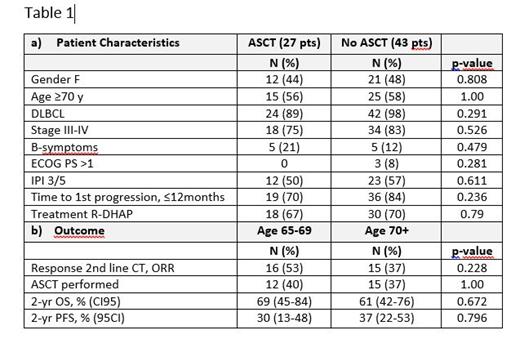Abstract
Introduction: We recently demonstrated in a large multicentre study that sGA can identify fit older patients with aggressive lymphoma able to tolerate first-line intensive treatment with curative intent and to obtain similar results than younger people (Merli at al JCO 2021). Regardless of age, about 40% of patients with aggressive lymphoma are either refractory or will eventually relapse after treatment with curative intent. Salvage platinum-based regimens followed by ASCT in responsive disease is a standard of care to obtain longer second remission. However, in many case series, patients over 65 years are excluded from the transplant approach because of potential severe toxicities of high-dose therapy in older patients. This study was designed to evaluate the feasibility and activity of high-dose treatment followed by ASCT in older FIT patients with R/R aggressive lymphoma selected with a sGA.
Methods: Patients with R/R aggressive lymphoma after one line of treatment, aged between 65 and 75, and FIT to sGA were eligible for the study. Salvage treatment could be chosen between R-DHAP, R-ICE or other platinum or gemcitabine-containing regimens and stem cells were mobilized after 1 or 2 cycles. Patients achieving at least partial response after 3 courses and who remained FIT to sGA evaluation were eligible for ASCT and were conditioned with either BEAM or FEAM.
Results: From May 2014 to August 2019, seventy-five patients from 16 FIL centres were enrolled and 70 were eligible for the study. Sixty-six of them had a diffuse large B-cell lymphoma, one had follicular 3b, 2 mantle cell and 1 Burkitt histology. Salvage treatment was R-DHAP in 48 patients, R-ICE in seven and gemcitabine or oxalyplatinum containing regimens in the remaining ones. Overall response rate after three courses was 44% (21 complete and 10 partial remission). Among the 39 unresponsive patients, 29 had progressive and 4 stable disease, 2 patients died of septic shock and heart failure during salvage and 4 patients withdrew their consent to ASCT. Four patients relapsed soon after response achievement before undergoing the transplant. ASCT was performed in 27 patients with a median of 5.6 x 10 6 CD34/Kg reinfused. No differences emerged in demographic and clinical characteristics between patients reaching the ASCT timepoint or not (Tab 1a). By intention to treat analysis, 2-y overall survival (OS) and PFS of the entire intention-to-treat population were 65% (95%CI: 50-76%) and 34% (95%CI: 22-46%) respectively, without differences according to age (Tab 1b). After a median of 27 months, 2-y OS was 79% (95CI: 51-86%) and EFS 56% (95CI: 32-75%). Twenty-four patients obtained a complete remission (CR) and 20 of them are in continuous CR after more than 12 months. Three patients progressed 1-8 months after ASCT and died. Most common non-hematologic grade 3-4 adverse events were gastrointestinal (10%) and infectious (8%).
Conclusion: This study shows that sGA can identify older patients with R/R aggressive lymphoma who are able to tolerate and can benefit from high-dose therapy and ASCT. The poor response to second-line immunochemotherapy remains the major drawback of this approach since less than 50% of patients could actually receive ASCT. Nevertheless the 2-y survival of 65% in the intention to treat population is remarkable and sets the stage for the evaluation of new approaches such as CAR-T or bispecific antibodies also in older patients. A next step should be to explore the usefulness of sGA in the selection of candidates to these innovative treatments.
Tucci: Takeda: Membership on an entity's Board of Directors or advisory committees; Gentili: Membership on an entity's Board of Directors or advisory committees; janssen: Membership on an entity's Board of Directors or advisory committees. Musuraca: janssen: Consultancy, Honoraria, Membership on an entity's Board of Directors or advisory committees; roche: Consultancy, Honoraria, Membership on an entity's Board of Directors or advisory committees; incyte: Consultancy, Honoraria, Membership on an entity's Board of Directors or advisory committees. Cavallo: ROCHE: Membership on an entity's Board of Directors or advisory committees; Servier: Speakers Bureau; Gilead: Speakers Bureau. Zilioli: Roche, Italfarmaco: Consultancy, Honoraria; MSD, Janssen: Consultancy, Membership on an entity's Board of Directors or advisory committees, Other: Travel, Accommodations; Gentili, Takeda, Gilead, Servier: Consultancy, Speakers Bureau; Takeda: Other: travel expenses, accommodation. Merli: EUSA Pharma: Other: Travel, Accomodations, Expenses; Roche: Membership on an entity's Board of Directors or advisory committees, Other: Travel, Accomodations, Expenses; Takeda: Membership on an entity's Board of Directors or advisory committees, Other: Travel, Accomodations, Expenses; MSD: Membership on an entity's Board of Directors or advisory committees; Gilead Science: Membership on an entity's Board of Directors or advisory committees, Other: Travel, Accomodations, Expenses; Janssen: Membership on an entity's Board of Directors or advisory committees, Other: Travel, Accomodations, Expenses; Celgene: Other: Travel, Accomodations, Expenses. Marcheselli: sandoz: Membership on an entity's Board of Directors or advisory committees. Rossi: Abbvie: Membership on an entity's Board of Directors or advisory committees; Alexion: Membership on an entity's Board of Directors or advisory committees; Astellas: Membership on an entity's Board of Directors or advisory committees; Daiichi Sankyo: Consultancy, Honoraria; Amgen: Honoraria, Membership on an entity's Board of Directors or advisory committees; Celgene: Membership on an entity's Board of Directors or advisory committees; Janssen: Membership on an entity's Board of Directors or advisory committees; Novartis: Membership on an entity's Board of Directors or advisory committees; Pfizer: Membership on an entity's Board of Directors or advisory committees; Jazz: Membership on an entity's Board of Directors or advisory committees; Sanofi: Honoraria; Takeda: Membership on an entity's Board of Directors or advisory committees.


This feature is available to Subscribers Only
Sign In or Create an Account Close Modal